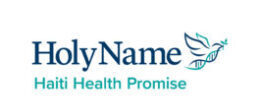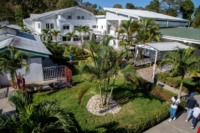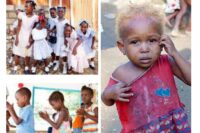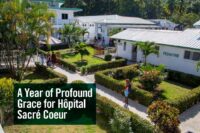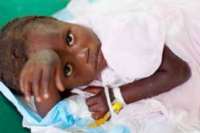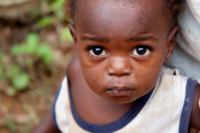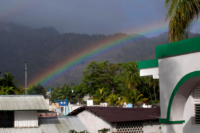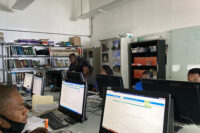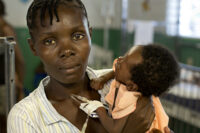By Tim Traynor, Director of HSC Non-Medical Programs
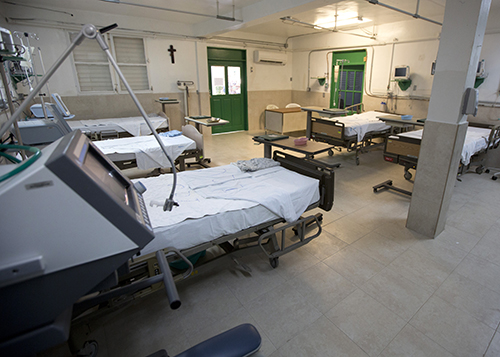 In the closing lines of that Coen brothers’ classic “The Big Lebowski,” the Dude declares, “Well, you know, sometimes you eat the bear, and uh…“ I was lying on my cot in the Mission House when I was awakened with a sense of dread. My chloroquine dreams often end in a feeling of disorientation, but on this early Haitian May morning, I felt like I was running away from something that had already gotten me in its grips. There was something sitting on my chest, an alien force that hovered over me, unseen but threatening. My heart was racing like a marathon runner and I had a dull pain that would not abate. I got up, slid into my T-shirt and shorts and headed to my little office a few yards away on the CRUDEM compound. I tried to continue my early morning routine by emptying the coffee maker and filling it from the water jug, but today I was not able to concentrate on even this mundane task.
In the closing lines of that Coen brothers’ classic “The Big Lebowski,” the Dude declares, “Well, you know, sometimes you eat the bear, and uh…“ I was lying on my cot in the Mission House when I was awakened with a sense of dread. My chloroquine dreams often end in a feeling of disorientation, but on this early Haitian May morning, I felt like I was running away from something that had already gotten me in its grips. There was something sitting on my chest, an alien force that hovered over me, unseen but threatening. My heart was racing like a marathon runner and I had a dull pain that would not abate. I got up, slid into my T-shirt and shorts and headed to my little office a few yards away on the CRUDEM compound. I tried to continue my early morning routine by emptying the coffee maker and filling it from the water jug, but today I was not able to concentrate on even this mundane task.
 I dropped myself into the chair opposite my computer monitor and thought about beginning the daily climb through email in hopes it would take my mind off of the odd sensations that continued.
I dropped myself into the chair opposite my computer monitor and thought about beginning the daily climb through email in hopes it would take my mind off of the odd sensations that continued.
Even though I work with doctors every day, I didn’t seem to recognize the danger signs of a heart attack, the sweating, radiating pain in the arm and jaw, the heaviness and dull aching in my chest.
By now the compound was beginning to arise. I heard someone approaching on the gravel outside the office screen door. It was Mike Canaire, a volunteer pediatrician from Baystate Medical Center in Springfield, MA, who arrived over the weekend. He was coming to say hello and bum a cup of Joe.
“Good morning, Tim. What’s going on?”
I was slumped in my chair with my chin resting on my chest. “Not so good this morning, Mike”, I croaked. Our tiny dialogue became serious. Mike took my pulse and said he thought I was in atrial fibrillation, a condition which pits one half the heart against the other, the responsible agent for the marathon effect, I guessed. Mike said we should go to the hospital and get an EKG to see what was happening. I offered to drive us both there on my motorcycle, but he opted for the short walk in lieu of my ludicrous suggestion.
We arrived at the front gate after some ridiculous conversation which was rooted in my lack of oxygenated brain cells. The guard smartly saluted as we passed and reached for my hand, a gesture of welcome. I mumbled something in Kreyòl like “have a nice goat” and we made the turn toward the back entrance to the ICU. At four in the morning, the sleepy little hospital does not resemble the manic activity that would begin in earnest in a couple of hours, throngs of people packed into our small courtyard, looking for medical help and solutions to often daunting health problems.
 We entered the door to our newly renovated space, a recent effort to provide antimicrobial surfaces like new ceramic walls and floor and a good coat of paint, a gift from one of our volunteer doctors who put his money where his mouth was. I made my way to a corner bed just opposite the nurse’s station where a young Haitian nurse named Timian was rising to greet me. She was an image to behold, dressed in a crisp, white uniform with the traditional nurse’s cap smartly on her head.
We entered the door to our newly renovated space, a recent effort to provide antimicrobial surfaces like new ceramic walls and floor and a good coat of paint, a gift from one of our volunteer doctors who put his money where his mouth was. I made my way to a corner bed just opposite the nurse’s station where a young Haitian nurse named Timian was rising to greet me. She was an image to behold, dressed in a crisp, white uniform with the traditional nurse’s cap smartly on her head.
It would be very usual for the nurses in our hospital to hesitate in the presence of their American counterparts, but Timian was not deterred. She began to respond immediately to the instructions Mike Canaire was delivering in quiet but efficient French.
Within a minute or two, I was connected to a vitals monitor and the EKG sensors were being attached. More instructions were given and medications were being sought.
From my bed, I saw Mike rifling through drawers and cabinets searching for the right elixir to slow my heart rate and get me off the precarious plateau I had placed myself. More minutes passed and I heard Mike say, “I know we had some. I saw it someplace yesterday!” I understood what that meant.
The drug he was looking for was not in abundance and depending on who might have needed it, it might be gone. More rushing about, more soft French, then somewhere in the fading distance I heard him say, “This will have to work. It is all we have.”
Mike gave me a shot in the abdomen and explained something more as an apology than a process and I closed my eyes. I was having a cardio event in a small, hospital in the north of Haiti where I had spent the past seven years trying to build and renovate facilities to handle just such a moment. What I had to recognize is that although the room was adequate, we still needed a wider complement of pharmacology and other SOP supplies. We also needed more Haitian doctors and nurses on our staff and the donors to sponsor them.
My event passed in a few hours but I needed to get to a place better equipped to manage my condition. My good friend and the foundation’s CEO, Mike Maron, was visiting and he made arrangements for me to fly back to New Jersey to Holy Name Hospital to continue my care. Sitting on the plane for the ride from Port au Prince to Kennedy, I found myself reflecting on what had just transpired. I was winging my way to a very advanced and competent facility in the Northeast, filled with technology, medications and some of the finest medical personnel in the US.
As the plane lifted off and banked over the tin roofs and tangled lives of my Haitian brothers and sisters below, I felt a strong pang of guilt. Although grateful for the flight, I had the sensation that I was abandoning them to save myself. And I thought about all of those who encounter these life and death experiences daily in a place that is woefully unprepared to address them. A place that doesn’t afford the basic elements to provide minimal hygiene or clean water to drink, where food is often a luxury and work is sporadic and pays little.
Since I first set foot in that troubled land, I have been challenged to find answers and solutions to what would be in America, simple problems. I often think of life as a big table at a great feast. Many people arrive and find a place to sit. The food is served at one end and often runs out before the last person is fed. Haiti sits at the very end of that table and many leave the feast without eating. And then there are those times when I notice empty chairs from the far end for those who could not wait for the food to be passed, whatever was left. They won’t return because their lives were cut short.
Hôpital Sacré Coeur is like a waiter who takes a little food from my end of the table and carries it to those at the other end. It is never enough to satiate their hunger, but it does keep them alive until better solutions can be found. I survived my calamity because of my position at
the table, but I wonder whether Haiti could survive its place in the absence of our efforts.
“Yon kwout nan pen se pi bon manje pase yon woch”…
“A crust of bread is better to eat than a stone.” This old Haitian proverb reminds us that healthcare in Haiti is part of the human feast no matter how inadequate it might currently be. In a country like America where we debate who should pay for such care, the point of its existence is moot. In Haiti, there is no debate only desperate circumstances that which demand immediacy of action and enough provisions to do this work.
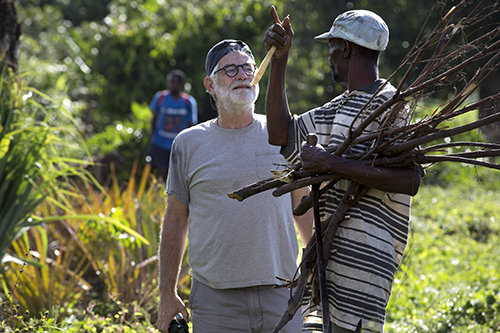 Those of you who read these stories are the key to maintaining the precious balance of life in the not so far off land of Haiti. Through your donations, no matter how small, you provide the bandages, the silk for stitches, the Betadine to disinfect, the salaries for our nurses and doctors, the fuel for our generators, the very sustenance that keeps Hôpital Sacré Coeur churning along through the daily grind of life in a bubble.
Those of you who read these stories are the key to maintaining the precious balance of life in the not so far off land of Haiti. Through your donations, no matter how small, you provide the bandages, the silk for stitches, the Betadine to disinfect, the salaries for our nurses and doctors, the fuel for our generators, the very sustenance that keeps Hôpital Sacré Coeur churning along through the daily grind of life in a bubble.
I am recuperating back home in South Carolina regaining my strength and temerity to head back to the land where all things are possible with a few resources and the will to affect change. Hopefully, I will not need my two Mike’s to get me to safety next time.
I look to the prospect that one day we will be able to provide such care as I needed without delay or regret, empowering that young nurse and her colleagues with the right tools, education and supplies for all of the people of our region.
